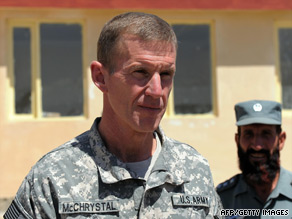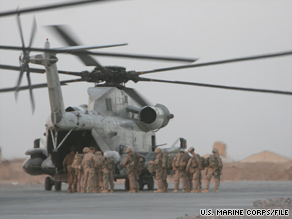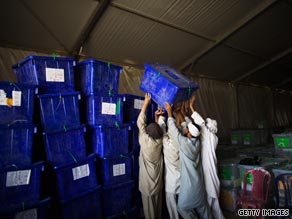 OK,
OK,(CNN) -- Success is achievable in Afghanistan if the United States revises its strategy there, the top U.S. commander in that country said in a statement issued Monday.

Gen. Stanley McChrystal visits an Afghan National Police compound. He called for a change of strategy Monday.
The statement came as Gen. Stanley McChrystal submitted a long-awaited report on the state of the U.S.-led war in Afghanistan.
"The situation in Afghanistan is serious, but success is achievable and demands a revised implementation strategy, commitment and resolve, and increased unity of effort," McChrystal said in the statement.
The general's review was passed on to Gen. David Petraeus, head of the U.S. Central Command, and Gen. Egon Ramms, senior NATO commander. It will also be forwarded to Defense Secretary Robert Gates, NATO Secretary General Anders Fogh Rasmussen and, eventually, President Obama.
Obama has called Afghanistan a "war of necessity" and has placed a great emphasis on defeating the Taliban and al Qaeda militants operating there and in Pakistan.
U.S., British and other international forces under the NATO umbrella in Afghanistan bolstered their presence this year to improve security for the recent presidential and provincial elections.
Violence has been particularly fierce in the south, where U.S. Marines have targeted the militants, and in the east near the Pakistani border, where American soldiers have been operating.
Don't Miss
Senior U.S. military officials have said the assessment shows that the Taliban exert "considerable influence" over a third of the country. Adm. Michael Mullen, chairman of the U.S. Joint Chiefs of Staff, said recently that the situation in Afghanistan is "serious and deteriorating."
Two U.S. service members were killed Monday in incidents involving roadside bombs in southern Afghanistan, according to the NATO-led International Security Assistance Force.
August has been the deadliest month for U.S. troops in Afghanistan since the U.S.-led invasion began in 2001. The deaths Monday bring to 48 the number of U.S. service members killed in Afghanistan in August. The highest monthly death toll previously was in July, when 45 U.S. service members were killed.
The United States now has about 62,000 U.S. troops in the country, and NATO allies have another 35,000. The Pentagon is planning to add 6,000 troops by the end of the year.
There have been indications that Obama soon could be asked to commit more American troops. Gates, however, has signaled he would like to gauge the impact of the additional 6,000 troops before considering whether to send more.
Asked if the president is concerned there might not be enough troops in Afghanistan, White House spokesman Bill Burton has said that Obama laid out a "winning strategy" earlier this year and the administration would wait for McChrystal's assessment and "make a decision accordingly."
As for the Afghan presidential elections, Afghan President Hamid Karzai still leads his rivals, according to the latest partial election results released Monday.
Karzai has almost 46 percent of the vote, compared with slightly over 33 percent for his nearest challenger, former Foreign Minister Abdullah Abdullah, the country's Independent Election Commission reported. Ramazan Bashardost is a distant third, with 12.5 percent.
The percentages reflect tallies from slightly less than half of the polling stations as the count of votes from the August 20 elections continues.
A candidate must win more than 50 percent of the vote to avoid a run-off. If no candidate wins an absolute majority, there will be a run-off between the top two contenders, most likely in mid-October.
Final results of the first round of voting are not expected until September.
----------------------
August is deadliest month for U.S. military in Afghanistan
- Story Highlights
- Roadside bombing brings number of U.S. military deaths in country this month to 46
- That's the highest monthly toll of the nearly eight-year-long conflict
- U.S., British, other international forces bolstered presence this year for elections
- U.S. commander in Afghanistan assessing progress of U.S. mission there
KABUL, Afghanistan (CNN) -- August has become the deadliest month for the U.S. military in Afghanistan since the U.S. invasion after the attacks of September 11, 2001.

U.S. Marines, with Afghan soldiers and police, board a helicopter at Forward Operating Base Dwyer, Afghanistan.
An American service member died in a roadside bombing in eastern Afghanistan on Friday, bringing the number of U.S. military deaths in the war-ravaged country in August to 46, according to a CNN count of military figures.
That's the highest monthly toll of the nearly eight-year-long conflict, surpassing the previous high of 45 in July.
President Obama has called the mission in Afghanistan a "war of necessity" and has placed a great emphasis on defeating the Taliban and al Qaeda militants operating there and in Pakistan.
U.S., British and other international forces under the NATO umbrella in Afghanistan bolstered their presence this year to improve security for last week's presidential and provincial elections.
Violence has been particularly fierce in the south, where U.S. Marines have targeted the militants, and in the east near the Pakistani border, where American soldiers have been operating.
Senior U.S. military officials said the latest military assessment shows that the Taliban exert "considerable influence" over a third of the country, and Adm. Michael Mullen, chairman of the U.S. Joint Chiefs of Staff, said recently that the situation in Afghanistan is "serious and deteriorating"
Don't Miss
The United States now has about 62,000 U.S. troops on the ground, and NATO allies have another 35,000. The Pentagon is planning to add 6,000 troops by the end of the year.
There have been indications that Obama soon could be asked to commit more American troops.
Gen. Stanley McChrystal, the top U.S. commander in Afghanistan, has been assessing the progress of Obama's mission there. The general is expected to present his review in the coming weeks, and a senior U.S. military official said last month that McChrystal was expected to request even more U.S. troops.
Members of a congressional delegation who met with him said there's no doubt he will ask for more troops.
The Pentagon, however, has said McChrystal has not yet decided whether to ask for more troops. And Defense Secretary Robert Gates has signaled that he would like to gauge the impact of the additional 6,000 troops before considering whether to send more.
Asked if the president is concerned there might not be enough troops on the ground, White House spokesman Bill Burton has said that Obama laid out a "winning strategy" earlier this year and that the administration would wait for McChrystal's assessment and "make a decision accordingly."
As for the Afghan presidential elections, Afghan President Hamid Karzai leads his rivals, according to the latest partial election results issued this week.
Karzai has 422,137 votes, compared with 330,711 for his nearest challenger, his former foreign minister, Abdullah Abdullah. Ramazan Bashardost is a distant third, with 108,156 votes.
Only 17.2 percent of the ballots from the August 20 election have been counted, the Independent Election Commission said. Final results are not expected until September.
UK: Troops did not die for just 150 Afghan votes
- Story Highlights
- British media claims just 150 votes cast in Afghan area where UK troops died
- UK ambassador to Kabul says too early to speculate on election results
- Defense officials say British forces know what they are fighting for
LONDON, England (CNN) -- UK officials have sought to play down low voter turnout in Afghanistan's elections amid reports just 150 people cast their ballots in an area where four British troops died securing it from the Taliban.

Ballot counting in the Afghan elections is expected to take several weeks.
British media claimed that early estimates of ballots in the former Taliban stronghold of Babaji in Helmand province indicated few exercised their voting rights, despite the efforts of Operation Panther's Claw, a five-week offensive against militants in the region.
The claims have fueled debate in Britain over the country's continued military role in Afghanistan as the country's death toll since operations began in 2001 pushes past the 200 mark.
Britain's ambassador to Kabul, Mark Sedwill, told journalists that while turnout in the August 20 presidential and provincial vote was low across the country, this was not a reflection of the success or failure of Panther's Claw.
"Panther's Claw, although timed to try to improve security for people to move around for the election, was not specifically itself about the election," Sedwill said via videophone link from Kabul. ![]() Watch concerns about NATO casualties, amid vote-rigging allegations »
Watch concerns about NATO casualties, amid vote-rigging allegations »
"The clear phase of that operation only ended a couple of weeks before the election... there is a long road to go until that entire area is fully secure."
Last month, senior British military commander Lt. Gen. Simon Mayall told a press briefing that Panther's Claw was aimed at safeguarding the elections in addition to securing long term stability in the area.
An editorial carried on the British Ministry of Defense Web site acknowledged that "many commentators are questioning whether the loss of... British lives in the operation was worth enabling such a small number of voters to exercise their democratic right."
The article quoted Assistant Chief of the Defense Staff (Operations), Air Vice Marshal Andy Pulford saying British efforts in the region were justified.
"British forces know exactly what they fought for. They have seen with their own eyes the improved quality of life that security now enjoyed by thousands of Afghans in Babaji has delivered," Pulford said.
"Low voter turnout or not -- and this has yet to be verified -- that security will be enduring. It will be there next week. It will be there next month. It will be there next year, and upon that security the Afghan government will continue to build a better life for the local people."
Don't Miss
Counting is still underway in elections with partial results showing incumbent President Hamid Karzai ahead of his former foreign minister and main rival Abdullah Abdullah.
The Afghan Independent Elections Commission said with 17.2 percent of polling stations tallied, Karzai had 44.8 percent against Abdullah's 35.1 percent. Candidates must get 50 percent to avoid a run-off between the top two contenders.
Final confirmed results are not expected until mid September, with a run-off likely to be held in October if necessary. Allegations of voter fraud on all sides are expected to further complicate proceedings.
The British Foreign Office said it was too early to speculate on voting figures in southern Afghanistan and Babaji in particular.
"While there has been speculation on these figures, much of which has been contradictory, we need to wait until the Afghan Independent Elections Commission produce their official results," a spokesman said.
"It is wrong to speculate on turn-out before the have finished counting and verifying the ballots."

Sedwill said he was "satisfied" with how the "rough and ready" election had been run, and that although participation in election had been low across the country, this did not represent a victory for the Taliban.
"Turnout was down, but it was down across the country although obviously the intimidation effect that the Taliban has in the south and the east did have an impact, but they were seeking to stop the elections all together not imply to disrupt the turnout and in that they failed," he said.

